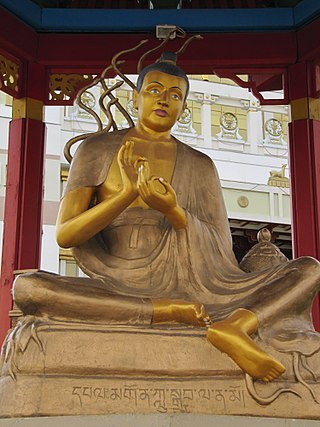Related Research Articles

Nāgārjuna [c. 150 – c. 250 CE (disputed)] was an Indian Mahāyāna Buddhist thinker, scholar-saint and philosopher. He is widely considered one of the most important Buddhist philosophers. Jan Westerhoff considers him to be "one of the greatest thinkers in the history of Asian philosophy."

Chandrakirti or "Chandra" was a Buddhist scholar of the madhyamaka school and a noted commentator on the works of Nagarjuna and those of his main disciple, Aryadeva. He wrote two influential works on madhyamaka, the Prasannapadā and the Madhyamakāvatāra.

Śūnyatā, translated most often as emptiness, vacuity, and sometimes voidness, is an Indian philosophical concept. Within Hinduism, Jainism, Buddhism and other philosophical strands, the concept has multiple meanings depending on its doctrinal context. It is either an ontological feature of reality, a meditative state, or a phenomenological analysis of experience.
The Middle Way as well as "teaching the Dharma by the middle" are common Buddhist terms used to refer to two major aspects of the Dharma, that is, the teaching of the Buddha. The first phrasing, refers to a spiritual practice that steers clear of both extreme asceticism and sensual indulgence. This spiritual path is defined as the Noble Eightfold Path that leads to awakening. The second formulation refers to how the Buddha's Dharma (Teaching) approaches ontological issues of existence and personal identity by avoiding eternalism and annihilationism.

Pratītyasamutpāda, commonly translated as dependent origination, or dependent arising, is a key doctrine in Buddhism shared by all schools of Buddhism. It states that all dharmas (phenomena) arise in dependence upon other dharmas: "if this exists, that exists; if this ceases to exist, that also ceases to exist". The basic principle is that all things arise in dependence upon other things.

Mādhyamaka, otherwise known as Śūnyavāda and Niḥsvabhāvavāda, refers to a tradition of Buddhist philosophy and practice founded by the Indian Buddhist monk and philosopher Nāgārjuna. The foundational text of the Mādhyamaka tradition is Nāgārjuna's Mūlamadhyamakakārikā. More broadly, Mādhyamaka also refers to the ultimate nature of phenomena as well as the non-conceptual realization of ultimate reality that is experienced in meditation.
The Mūlamadhyamakakārikā, abbreviated as MMK, is the foundational text of the Madhyamaka school of Mahāyāna Buddhist philosophy. It was composed by the Indian philosopher Nāgārjuna.

East Asian Madhyamaka refers to the Buddhist tradition in East Asia which represents the Indian Madhyamaka (Chung-kuan) system of thought. In Chinese Buddhism, these are often referred to as the Sānlùn school, also known as the "emptiness school", although they may not have been an independent sect. The three principal texts of the school are the Middle Treatise, the Twelve Gate Treatise, and the Hundred Treatise. They were first transmitted to China during the early 5th century by the Buddhist monk Kumārajīva (344−413) in the Eastern Jin Dynasty. The school and its texts were later transmitted to Korea and Japan. The leading thinkers of this tradition are Kumārajīva's disciple Sēngzhào, and the later Jízàng. Their major doctrines include emptiness (k'ung), the middle way (chung-tao), the twofold truth (erh-t'i) and "the refutation of erroneous views as the illumination of right views" (p'o-hsieh-hsien-cheng).
The Sautrāntika or Sutravadin were an early Buddhist school generally believed to be descended from the Sthavira nikāya by way of their immediate parent school, the Sarvāstivādins. While they are identified as a unique doctrinal tendency, they were part of the Sarvāstivāda Vinaya lineage of monastic ordination.
The Buddhist doctrine of the two truths differentiates between two levels of satya in the teaching of the Śākyamuni Buddha: the "conventional" or "provisional" (saṁvṛti) truth, and the "ultimate" (paramārtha) truth.

Bhāviveka, also called Bhāvaviveka, and Bhavya was a sixth-century madhyamaka Buddhist philosopher. Alternative names for this figure also include Bhavyaviveka, Bhāvin, Bhāviviveka, Bhagavadviveka and Bhavya. Bhāviveka is the author of the Madhyamakahrdaya, its auto-commentary the Tarkajvālā and the Prajñāpradīpa.
Buddhapālita was an Indian Mahayana Buddhist commentator on the works of Nagarjuna and Aryadeva. His Mūlamadhyamaka-vṛtti is an influential commentary to the Mūlamadhyamakakarikā.
Apaurusheya, meaning "not of human" or "impersonal, authorless", is a term used to describe the Vedas, the earliest scripture in Hinduism.

Buddhist logico-epistemology is a term used in Western scholarship for pramāṇa-vāda and Hetu-vidya. Pramāṇa-vāda is an epistemological study of the nature of knowledge; Hetu-vidya is a system of logic. These models developed in India during the 5th through 7th centuries.
Catuṣkoṭi is a logical argument(s) of a 'suite of four discrete functions' or 'an indivisible quaternity' that has multiple applications and has been important in the Dharmic traditions of Indian logic, the Buddhist logico-epistemological traditions, particularly those of the Madhyamaka school, and in the skeptical Greek philosophy of Pyrrhonism.

In logic, reductio ad absurdum, also known as argumentum ad absurdum or apagogical arguments, is the form of argument that attempts to establish a claim by showing that the opposite scenario would lead to absurdity or contradiction. This argument form traces back to Ancient Greek philosophy and has been used throughout history in both formal mathematical and philosophical reasoning, as well as in debate.

Buddhist thought and Western philosophy include several parallels.

Advaita Vedanta and Mahayana Buddhism share significant similarities. Those similarities have attracted Indian and Western scholars attention, and have also been criticised by concurring schools. The similarities have been interpreted as Buddhist influences on Advaita Vedanta, though some deny such influences, or see them as expressions of the same eternal truth.
Jay Lazar Garfield is an American professor of philosophy who specializes in Tibetan Buddhism. He also specializes on the philosophy of mind, cognitive science, epistemology, metaphysics, philosophy of language, ethics, and hermeneutics. He is currently Doris Silbert Professor in the Humanities at Smith College, professor of philosophy at the University of Melbourne, visiting professor of philosophy and Buddhist studies at Harvard Divinity School, and Adjunct Professor of Philosophy at the Central University of Tibetan Studies.
According to Edward Conze, Greek Skepticism can be compared to Buddhist philosophy, especially the Indian Madhyamika school. The Pyrrhonian Skeptics' goal of ataraxia is similar to the Buddhist soteriological goal nirvana.
References
- ↑ "Professor Jan Westerhoff". Faculty of Theology and Religion. University of Oxford. Retrieved 22 November 2017.
- 1 2 3 4 "CV - J. Westerhoff". Jan Westerhoff. Retrieved 22 November 2017.
- 1 2 "Prof Jan Westerhoff". Lady Margaret Hall. University of Oxford. Retrieved 22 November 2017.
- ↑ "Dr Jan Christoph Westerhoff". SOAS University of London. Retrieved 22 November 2017.
- ↑ Westerhoff, Jan Christoph (2003). "An inquiry into the notion of an ontological category". E-Thesis Online Service. The British Library Board. Retrieved 22 November 2017.
- ↑ Westerhoff, Jan Christoph (2003). Nagarjuna's madhyamaka: A philosophical investigation. E-Thesis Online Service (phd). The British Library Board. doi:10.25501/SOAS.00029362 . Retrieved 22 November 2017.
- ↑ Is Reality an Illusion? (Motion picture | Jan Westerhoff). The Institute of Art and Ideas. 10 November 2019.